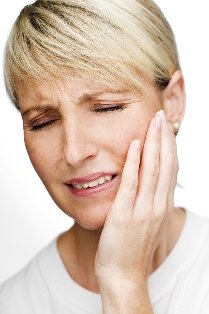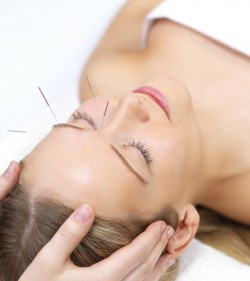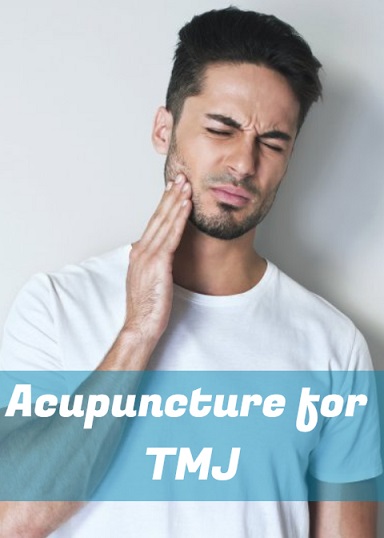Acupuncture for Temporomandibular Joint Disorder, or TMJ, is a well-known treatment option in both eastern and western medicine. So much so that there are even larger insurance companies like Aetna and Horizon Blue Cross Blue Shield that cover TMJ/TMD if you have acupuncture coverage under your plan. This is because acupuncture for TMJ has been shown to be extremely effective in a relatively short period of time especially in pain and quality of life.
What is TMJ?

The condition arises at the temporomandibular joint, or the hinge that connects your jawbone to your skull with one on each side of your jaw. TMJ disorders can cause pain in the joint of your jaw, the muscles that control jaw movement, and facial pain. According to the National Institute of Dental and Craniofacial Research, 10 million Americans suffer from TMJ, and is more common amongst women than men.
Signs & Symptoms of TMJ:
- Pain in the jaw
- Aching pain in and around the ear
- Difficulty chewing or pain while chewing
- Pain in one or both of the temporomandibular joints
- Aching facial pain
- Locking of the joint (difficulty closing and opening your mouth)
TMJ can also be very difficult to diagnose because the exact cause for each individual can be difficult to determine. Health professionals believe that it may be due to things like genetics, jaw injury, problems with the muscles in the jaw, and problems with the jaw itself, but it could be any number of things or a combination.
Possible causes of TMJ:
- Injury to the jaw, joint, or muscles of the head & neck (such as whiplash)
- Grinding or clenching your teeth
- Movement of the disc between the ball & socket of the joint
- Arthritis in the joint
- Stress which can cause someone to tighten the facial & jaw muscles or clench teeth
- Erosion of the joint
- Structural jaw problems present at birth
- Orthodontic braces
- Poor posture straining muscles in the face & neck
- Poor diet
- Lack of sleep
In addition to these possible causes, it is believed that there are some health conditions that may be associated with TMJ. Many times your general practitioner may refer you to an Ear, Nose, and Throat (ENT) doctor or use x-rays and/or CT scan to determine a diagnosis.
Conditions associated or possibly coexisting with TMJ:

- Allergies
- Chronic fatigue syndromes
- Dizziness
- Ear pain & Tinnitus (ear ringing)
- Endometriosis
- Fibromyalgia
- Generalized pain
- IBS (irritable bowel syndrome)
- Sleep disorders
- Chronic headaches
- Cardiac arrhythmias
Many of these conditions can often be mistaken as a solo issue, when in fact, you may have TMJ as well. However, the actual root cause of TMJ is not clear, and there are no standard tests that are used to determine if you have it. Many doctors will recommend treating TMJ at home by eating soft foods, using ice to reduce swelling, minimize jaw movements, avoid chewing gum & tough foods, reduce stress, and jaw stretching exercises to improve movement. If these do not ease symptoms, many doctors recommend over the counter or prescription medications.
Western Medicine Treatments for TMJ:
- Pain medication (such as Ibuprofen)
- Medication to relax the muscles in the jaw (such as Soma, Flexeril, or Valium)
- Medication to reduce swelling in the jaw (corticosteroid drugs)
- Botox to reduce tension in the nerves & muscles of the jaw
- Cognitive behavioral therapy to reduce stress
- Bite guards to prevent teeth grinding
If the symptoms are serious enough, a doctor may even recommend surgery such as a corrective dental treatment, arthrocentesis (removing fluid from the joint), or replacement of the joint, however these instances are rare. In most cases, many TMJ symptoms seem to be centered around stress which acupuncture has been shown to help with, in addition to TMJ itself.
TMJ & Acupuncture

The real question is: does acupuncture help TMJ? How does it help TMJ? Acupuncture targets the root cause of TMJ by balancing the mind & body through channels called meridians which helps reset the muscular tension in the jaw. As we said above, many cases of TMJ have an underlying issue of stress bringing tension in the muscles in the jaw and face. Acupuncture relaxes targeted muscles with acupuncture points, and with those points stimulated, it creates better blood flow, releases endorphins, improves energy, & balance allowing for decrease in overall stress level to relieve TMJ discomfort.
TMJ Acupuncture Points:
- ST7 – Below the Joint – Xiaguan – located on the face near the ear, and is used for TMJ, facial pain, lower jaw toothache, hearing issues, tinnitus, and ear pain.
- ST6 – Jawbone – Jiache – also located on the face near the jawline, and is used for TMJ, toothache, twitching, facial pain, and lockjaw.
- ST45 – Severe Mouth – Lidui – located on the second toe near the nail, and is used for TMJ, headaches, toothaches, facial pain, bell’s palsy, and calms the spirit.
- SI19 – Auditory Palace – Ting Gong – located right where the ear meets the head, and is used for TMJ, toothache, ear problems (inflammation, tinnitus, hearing loss), and calms the spirit.
- SI17 – Celestial Countenance – Tian Rong – located on the side of the neck near the jawline, and is used for TMJ, gum problems, improve circulation of the facial nerves, and ear issues (tinnitus, deafness).
There are many varying combinations of points that could be used, and that will all depend on the traditional Chinese medicine (TCM) diagnosis that your licensed acupuncturist gives in regards to your TMJ symptoms. These acupuncture points for TMJ are normally stimulated for 10-20 minutes after insertion, or sometimes longer. Depending on the acupuncturist, electroacupuncture may also be used for extra stimulation of the points. A licensed acupuncturist will also use additional points to flush toxins, boost immunity, and calm the mind in the same session.
Essentially, in using acupuncture to treat TMJ, it will treat stress, system imbalances, and pain in the jaw all in one treatment. Acupuncture relieves muscle spasms, and decreases pain & swelling, which helps release the jaw naturally for the joint to move more freely.
TMJ Acupuncture Research
As we said in the beginning, the benefits of acupuncture for TMJ are many, and the research is out there to prove it, and there are still many being conducted as the years go on.
Ear Acupuncture Therapy for Masticatory Myofascial & Temporomandibular Pain 2015:
- The goal of this clinical trial was to evaluate the action of auricular (ear) acupuncture through the evolution of masticatory myofascial and temporomandibular symptoms. The group of 20 patients were separated into two groups: auricular acupuncture with an occlusal splint, and the use of occlusal splint alone (control).
- Symptoms were evaluated in five different moments every seven days analyzing the muscle & joint palpation in order to measure the intensity of pain.
- The study concluded that while both groups did show reduction of pain, the auricular acupuncture group showed “expressive and significant reduction of symptomatology” within just the first week of therapy. Auricular acupuncture was effective in the reduction of symptoms.
Acupuncture Therapy in the Management of the Clinical Outcomes of TMD 2017:
- The goal of this meta-analysis was to evaluate acupuncture therapy in the management of temporomandibular disorders (TMD) in adults. A total of 9 studies were reviewed & eligible from 8 publications involving 231 patients.
- They compared the main outcome of visual analog scale (VAS) values of pain between acupuncture and control groups which showed significant decrease in the VAS following acupuncture treatment. They concluded that acupuncture therapy is effective in reducing the degree of pain in patients with TMD especially in those with myofascial pain symptoms.
The more mainstream acupuncture becomes, the more studies there will be. Now that the western world of medicine is beginning to see the benefits of acupuncture, you can look forward to more studies revealing the inner workings of acupuncture and its benefits.
Acupuncture for TMJ Near Me
Acupuncture for TMJ has gained a lot of attention in recent years for its many benefits. Licensed acupuncturists work diligently with TMJ patients with acupuncture and TCM treatment to guide their patients through lifestyle changes to eliminate TMJ discomfort. The TMJ Association even recommends acupuncture as an effective treatment option for individuals with this condition.
The prevalence of TMJ in the U.S. is between 5% and 12%, and 85% of patients with TMJ also experience other painful conditions in other parts of the body mentioned above. That being said, acupuncture is truly an all inclusive and holistic treatment treatment option. Contact an acupuncturist near you today to find out if acupuncture for TMJ is right for you.

Acupuncture Near Me
Get acupuncture near you today with Best Acupuncture Near Me, and contact a local acupuncture practitioner to find out if acupuncture is right for you.
Find a local acupuncture provider

